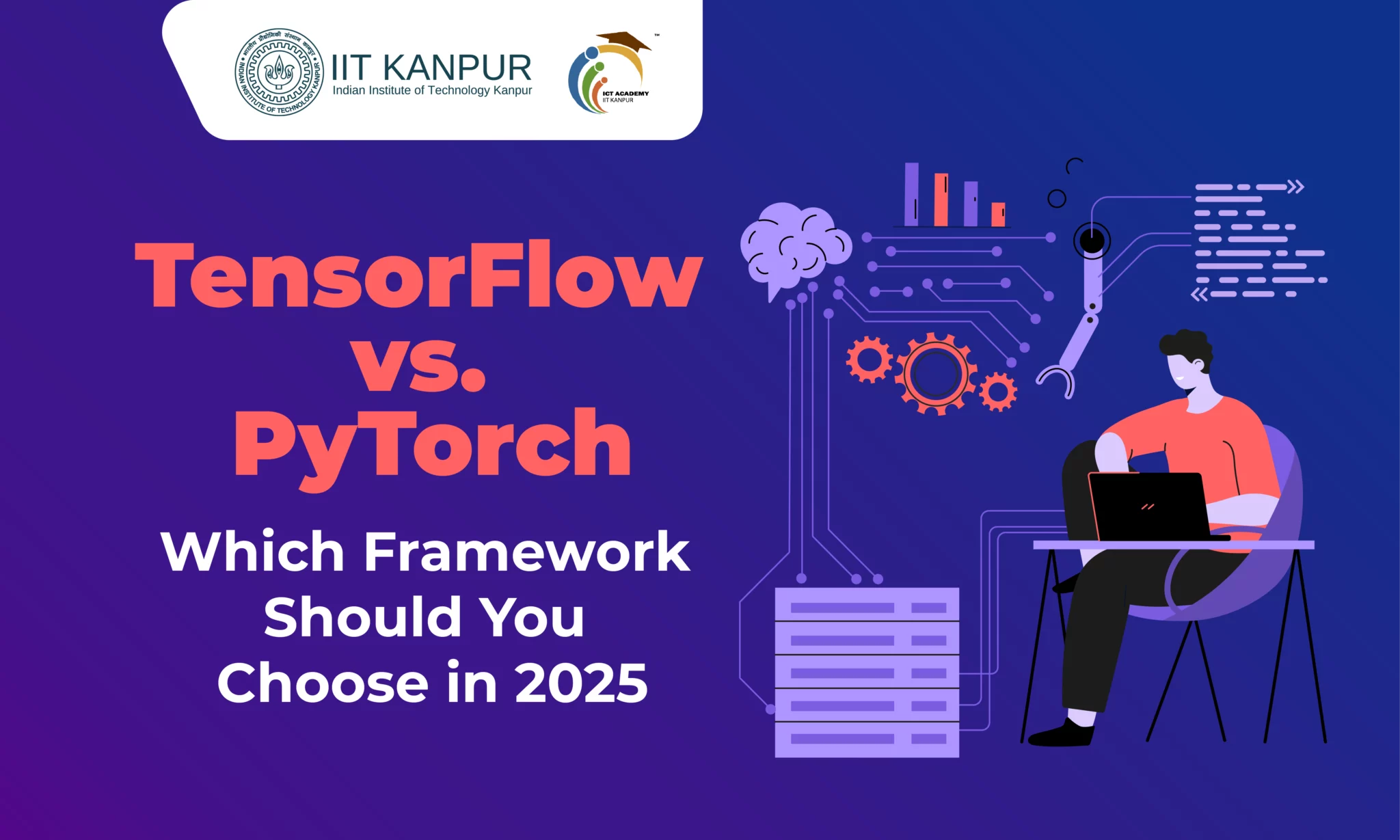TensorFlow vs. PyTorch: Which Framework Should You Choose in 2026

Introduction
Artificial Intelligence (AI) and Machine Learning (ML) are doing wonders today. It can
- Process volumes of data in seconds
- Make intelligent predictions
- Prevent cybercrimes like hacking
- Do creative tasks like writing and more
However, the science behind these advanced technologies is deep learning models.
A subset of ML, deep learning, uses something called neural networks. These networks are inspired by human brains. So, they mimic how we humans would work, allowing machines to learn from data in a way that feels almost human.
Now, when it comes to building and deploying deep learning, tech giants like Google and Meta have developed software frameworks. They are -TensorFlow and PyTorch. While both frameworks are popular, they have their own set of pros, cons, and applications.
This blog will closely examine the difference between Pytorch and TensorFlow and how they work.
When you reach the end of the blog, you can decide which framework to go with for your projects.
But First, what is TensorFlow? And what is PyTorch?
Let’s jump into that.
Basics of what is Tensorflow
TensorFlow is basically a software tool that helps computers learn and work with artificial intelligence.
Developed By: Google
TensorFlow-
- Handles complex mathematical calculations automatically
- Works on different devices (phones, computers, servers)
- Has a huge community that shares code and solutions
Let’s break it down with an example.
Imagine you’re building a weather prediction app. It shows all the weather data—temperature, humidity, wind speed, etc. TensorFlow can:
- Learn from Data – It studies past weather patterns.
- Find Relationships – It figures out how temperature and humidity affect rainfall.
- Make Predictions – It gives the weather forecast for whether it will rain tomorrow based on today’s weather.
TensorFlow offers several tools like –
- TensorFlow Lite – for mobile devices
- TensorFlow Serving – for deploying models
- TensorFlow.js – to run ML models in your web browser.
Now, you might wonder why the name TensorFlow.
- Tensor means data stored in grids (like rows and columns in Excel).
- Flow means how this data moves through different layers to get processed.
Together, TensorFlow helps handle large amounts of data and processes it step-by-step—just like solving a math problem on paper.
Key Features:
- Scalable Models: Suitable for large-scale data processing.
- TensorBoard: Provides visualization tools for tracking performance.
- Keras Integration: Simplifies neural network implementation.
Cross-Platform Support: Works on mobile, web, and edge devices.
Examples:
- Google Translate for language translations.
- Image recognition tools like Google Photos.
- Instagram Filters – Enhances photos using AI models.
- Voice recognition in Google Assistant.
Industries Using TensorFlow:
- Healthcare for diagnosis predictions.
- Finance for fraud detection.
- Retail for recommendation engines.
Basics of What is PyTorch
PyTorch is another deep-learning model for building and training artificial intelligence (AI) models. It is mainly used by researchers and data scientists to build AI models.
Developed By: Meta (then Facebook)
Pytorch comes with –
- Python and C++ interface
- Tensors that help with mathematical operations
- Dynamic computation graphs
- Python-friendly libraries and tools
- Built-in support for automatic differentiation
Where did it get the name from?
- “Py” – comes from Python, the programming language it is written in.
- “Torch” – Refers to its ability to “light the way” for AI models, helping them learn and adapt.
Key Features:
- Dynamic Computation Graphs: Allows real-time model adjustments.
- Pythonic Framework: Seamlessly integrates with Python libraries.
- Strong Debugging Tools: Makes debugging easier with real-time testing.
Community Support: An active community of developers for support.
Examples:
- Natural Language Processing (NLP) systems.
- Autonomous driving research projects.
- Robotics for reinforcement learning.
Industries Using PyTorch:
- Academia and research labs.
- Gaming for AI-based interactions.
- Manufacturing for process automation.
Tensorflow vs PyTorch - Key Differences You Should Know
| Feature | TensorFlow | PyTorch |
|---|---|---|
| Origin | Made by Google | Made by Meta (Facebook) |
| Popularity | Widely used in production environments | Preferred for research and experimentation |
| Flexibility | More rigid | Highly flexible |
| APIs & Ease of Use | Offers both high-level and low-level APIs | Uses low-level APIs and is more Pythonic |
| Learning Curve | Steeper for beginners | Generally easier for newcomers |
| Programming Approach | Static computation graphs | Dynamic computation graphs |
| Ease of Use | Slightly complex for beginners. | Beginner-friendly and Pythonic. |
| Deployment Options | Great for mobile and embedded systems | Limited deployment options |
| Debugging Tools | Built-in TensorBoard for visualization | Python debugging tools like PyCharm |
| Ecosystem | Mostly used in production and large-scale projects | Better for research and prototyping |
How Do You Choose Between TensorFlow vs PyTorch?
Now that you know how useful these frameworks are, choosing one of two can be tricky. So ask yourself –
Are you a beginner?
If yes, then you might find PyTorch easier. But, if you have experience in deep learning and are looking for advanced features, both frameworks are suitable. However, you may prefer TensorFlow because of its extensive ecosystem.
What is your primary use case?
For flexibility and small-scale projects, pytorch is considered an ideal choice. But for large-scale projects and production-ready applications, Tensorflow shines brighter.
Do you have performance and optimization requirements?
If yes, then TensorFlow is better, especially for large-scale deployments. Pytorch can be considered for standard performance.
Are collaboration and team skills a consideration?
If your team is already experienced with one of the frameworks, stick with that framework for consistency, regardless of the pros and cons of each. However, knowing PyTorch and TensorFlow can be advantageous if you need cross-team collaboration.
How important is ease of use to you?
If flexibility is a major need, go for PyTorch. But, if you are willing to invest time to learn a more structured approach for potentially better performance optimizations, TensorFlow is worth considering.
Will you benefit from specific features of either framework?
If you require specific functionalities such as TPU support for large-scale training, TensorFlow may be advantageous. Conversely, if you need rapid iterations focusing on research, PyTorch’s flexibility will be beneficial.
Conclusion
That said, when it comes to choosing between PyTorch and TensorFlow, there’s no one-size-fits-all answer.
The good news? You can’t go wrong with either!
Researchers often prefer PyTorch for its flexibility, while TensorFlow shines in production environments.
Regardless of your chosen path, both have strong communities, tons of tutorials, and great support to help you along the way.
Why Choose Us?
- 180 hours of learning
- Industry-expert faculty
- Hands-on experience with 70% practical content
- 7 real-world projects
- Official certification from IIT Kanpur
- Placement assistance
Don’t just learn AI – master it with one of India’s most prestigious technical institutions. Enroll now to transform your career in 2026!
Recommended Courses

Advanced Certificate Program in AI for Leaders

AI & Digital Transformation

AI for Machine Learning: Foundations to Frontier Applications

AI for Managers

AI Product Leadership Program

Deep Learning with Generative AI for Computer Vision

Generative AI Course

Generative AI for Computer Vision

Generative AI – 2-Day Offline Workshop

Machine Learning with Python

Professional Certificate Course in Generative AI and Machine Learning

Professional Certificate Program in Leadership with AI



